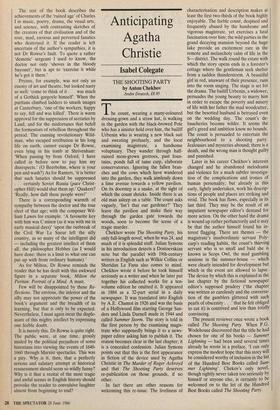Anticipating Agatha Christie
Isabel Colegate
THE SHOOTING PARTY by Anton Chekhov
Andre Deutsch, 1'8.95
The count, wearing a many-coloured dressing-gown and a straw hat, is walking in the garden with the black-browed Pole who has a sinister hold over him, the bailiff Urbenin who is wearing a new black suit and sweating profusely, and the local examining magistrate, a handsome voluptuary. They wander through half- ruined moss-grown grottoes, past foun- tains, ponds full of tame carp, elaborate conservatories. Ignoring the fallen bran- ches and the cows which have wandered into the garden, they walk aimlessly down a lime avenue towards a yellow pavilion. On its doorstep is a snake, at the sight of which the count shrieks. Inside there is an old man asleep on a table. The count asks vaguely, 'Isn't that our gardener?' They leave the pavilion and make their way through the garden gate towards the woods, soon to become the scene of a tragic murder.
Chekhov wrote The Shooting Party, his only full-length novel, when he was 24, and much of it is splendid stuff. Julian Symons in his introduction detects a DostoeVskian note but the parallel with 19th-century writers in English such as Wilkie Collins or Sheridan Le Fanu also comes to mind. Chekhov wrote it before he took himself seriously as a writer and when he later put together his collected works for a ten- volume edition he omitted it. It appeared in 1884 as a 32-part serial in a daily newspaper. It was translated into English by A.E. Chamot in 1926 and was the basis of a Hollywood film starring George San- ders and Linda Darnell made in 1944 and called Summer Storm. The story is told in the first person by the examining magis- trate who supposedly brings it to a news- paper editor asking him to publish it. The reason becomes clear in the last chapter; it is a concealed confession. Julian Symons points out that this is the first appearance in fiction of the device used by Agatha Christie in The Murder of Roger Ackroyd and that The Shooting Party deserves re-publication on those grounds, if no other.
In fact there are other reasons for welcoming this re-issue. The liveliness of characterisation and description makes at least the first two-thirds of the book highly enjoyable. The feeble count, despised and frequently abused by the handsome and vigorous magistrate, yet exercises a fatal fascination over him; the wild parties in the grand decaying mansion beyond the huge lake provide an excitement rare in the remote and melancholy calm of life in the S— district. The walk round the estate with which the story opens ends in a forester's cottage where the gentleman seek shelter from a sudden thunderstorm. A beautiful girl in red, unaware of their presence, runs into the room singing. The stage is set for the drama. The bailiff Urbenin, a widower, persuades the young beauty to marry him in order to escape the poverty and misery of life with her father the mad woodcutter, but the besotted husband is betrayed even on the wedding day. The count's de- baucheries become wilder. It seems the girl's greed and ambition know no bounds. The count is persuaded to entertain the neighbourhood to a shooting party. Jealousies and mysteries abound; there is a death, and the wrong man is thought guilty and punished.
Later in his career Chekhov's interests changed and he abandoned melodrama and violence for a much subtler investiga- tion of the complications and ironies of human personality; but already in this early, lightly undertaken, work his descrip- tions of people and places are striking and vivid. The book has flaws, especially in its last third. They may be the result of an impatient newspaper editor's demand for more action. On the other hand the drama is wound up rather perfunctorily and it may be that the author himself found his in- terest flagging. There are themes — the magistrate's insubordinate servant Poly- carp's reading habits, the count's thieving servant who is so small and bald she is known as Scops Owl, the mad gambling sessions in the summer-house — which were clearly intended for development but which in the event are allowed to lapse. The device by which this is explained in the last chapter by the fictional newspaper editor's supposed prudery (`the chapter was written so carelessly and the conversa- tion of the gamblers glittered with such pearls of obscenity . .' that he felt obliged to cut it) is contrived and less than totally convincing. The present reviewer once wrote a book called The Shooting Party. When P.G. Wodehouse discovered that the title he had chosen for one of his books — Summer Lightning — had been used several times already he wrote in a preface, 'I can only express the modest hope that this story will be considered worthy of inclusion in the list of the Hundred Best Books called Sum- mer Lightning'. Chekov's only novel, though rightly never taken too seriously by himself or anyone else, is certainly to be welcomed on to the list of the Hundred Best Books called The Shooting Party.


















































 Previous page
Previous page